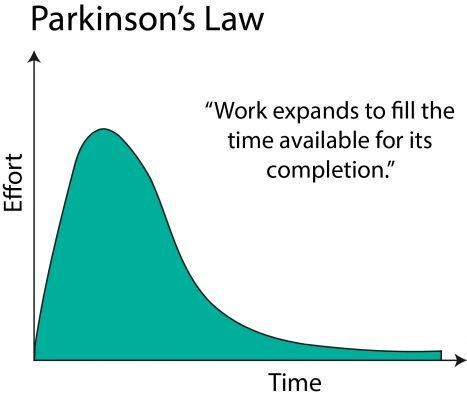The Kaizen Newsletter #56 (28/07/2020) - Bypassing Parkinson's Law
Thoughts on structured procrastination, on being prepared and optionality
Hey friend 👋,
Welcome to the 56th edition of the Kaizen Newsletter ⛩, a weekly newsletter where I share my thoughts, new ideas I learn and make weird connections between self-improvement, productivity, product, tech, sports, anime.
(if you got referred to this page by a friend or simply visiting you can subscribe here👇)

It was 10:30 PM and I knew my roommate was coming back in soon. It was now or never to get things done because I was waiting for him to come back so that we can do a quick bike ride before going to sleep.
So I pulled up my Japan Sinks lofi playlist and started my weekly review. And after a few minutes, I felt it. I was in flow. Everything seemed to be working and I knew I would be able to get everything done in time.
To give you an idea, this is what it feels like when you're in flow.

It's like you suddenly become this other person who can accomplish anything that they wanted.
But what's frustrating is that I can't control this pseudo-superpower.
It only appears when I'm pressured to meet a certain deadline. AND ONLY THEN can I tap into this power.
This phenomenon of pushing things till the very last minute is explained by Parkinson's Law, which stipulates that "work expands so as to fill the time available for its completion."
That's why in school, even if the teacher gives you 2 months to complete your project, for some reason, we wait until the weekend before the deadline and rush to complete it.
So how can we bypass Parkinson's Law?
In tech, it's a common practice among engineering teams to bypass Parkinson's Law by breaking down bigger projects into smaller pieces to include more frequent deliverables instead of rushing to do everything at the very end.
This practice is known as SCRUM methodology which breaks down product development into "sprints". This works in product development because the company depends on the engineering team to deliver something by the end of the sprints. If you don't, then the whole company suffers, so it's easy to push yourself to meet the deadlines.
But what about for smaller personal projects like consistently shipping your own newsletter? In this case, the only person you're depending on is yourself.
That's when I turned to my Twitter friends for some help.
And surprisingly, I got tons of answers on how people defeat procrastination.
The most recurrent answer I got was to set shorter deadlines or fake deadlines. Seems familiar?
Setting shorter or fake deadlines is the whole concept behind the SCRUM methodology.
As I explained, SCRUM works because you have a team, stakeholders and users that are waiting for new features or bug fixes. There are actual consequences when you don't deliver.
But when it comes to your own personal projects, the only consequence of not respecting these shorter/fake deadlines is that everything will be pushed right before the deadlined of said project.
And that's why this particular method doesn't work for me. I can't seem to "fool" myself to deliver something before the real deadline.
However, there was one other really good post from my friend James Stuber.
He linked me to this post on structured procrastination and it was the most convincing method to bypass Parkinson's Law.
So what is structured procrastination?
First, let's define what exactly makes a person a procrastinator.
Usually, you associated a procrastinator as someone who's lazy and doesn't want to work.
But that's not true. Or that's not the whole story.
A procrastinator does things, just not the most important things.
This means that if I have a long to-do list, I'll most likely do items 2, 3, 4, and 5. I just won't do the first one on my list.
What the author suggests doing is a bit of self-deception.
Yes, I know. I've said earlier that I'm not able to fool myself, but this is a structured (get it?) way of fooling yourself.
To effectively deceive yourself, you need to find the ideal projects to put on the top of your to-do list. These projects have two defined characteristics.
First, they seem to have clear deadlines, but actually don't. Second, they seem important, but really aren't. - John Perry
One seemingly important project that I've been pushing off for a while now is redesigning my website. I've been pushing off creating my website in Webflow because I was too busy doing other stuff. That's a good example of a project that seems to have a "clear deadline" and that is "important", but isn't in reality.
As James described it to me, try to think of big daunting projects that you are putting off.
These are the types of projects that you want to introduce at the top of your to-do list so that you'll be able to go through your other to-do's on your list.
Procrastination has always been a daunting topic as I've always struggled with it, but I've been enjoying trying to find ways on how to beat it. Structured procrastination is a solution I haven't heard before which is why I wanted to write about it, but I'm thinking of turning this into a bigger essay on procrastination.
If this is something that you would be interested in, let me know in the comments or feel free to reach out to through email or by DM on Twitter!
And who knows, maybe this essay will become my new daunting project that will be put on the top of my to-do list ;).
Thanks to James for further clarifying structured procrastination and giving me some tangible examples.
Now, on to the newsletter.
🤔 Thoughts
💻 Thoughts on being prepared
First of all, if you haven't seen this application video, I highly suggest you take ~ two minutes to check it out - it's amazing!
I remember seeing this video go viral earlier this year and immediately thought to myself "this kid really has it."
Fast forward to a few days ago and Yes Theory releases a video on how they helped Ivan create this video for his application at 100 Thieves, the company he wanted to work for.
I'm not gonna lie, I was a BIT disappointed that this video wasn't entirely produced by him but happy to see all the effort that Yes Theory put in to make this work. And that realistically, the video and launch could've been done by Ivan all by himself.
Anyways, what I actually wanted to talk about is one particular moment in this video that was responsible for generating this thought in the first place.
No, not when he launched the video and went viral. It actually happened near the beginning of the video when
No, not when he launched the video and got viral. It actually happened near the beginning of the video when Yes Theory explains why they chose to help Ivan instead of any other application they received.
And the reason why?
It's because he put in the work beforehand.
He didn't just email Yes Theory saying "Yo, gaiz, this job is SOOOOO COOOOL! Plz halp me." Instead, he listed out all the reasons why he believes he would deserve the job and even already tried to contact 100 Thieves (but didn't get a response).
I'm sure that a lot of comments are saying "wow, he's so lucky that Yes Theory chose him over all the over applicants!"
But is he really?
For sure luck had a role in this situation, but I truly believe that these once in a lifetime opportunities come to the people who are prepared.
These are the type of people that others will gladly help.
To make sure that you can seize these opportunities, make sure to put in the work and be prepared.
🎓 Thoughts on optionality
I've always optimized for optionality. The reason why I chose health sciences in CEGEP (a 2-year school that's in-between high school and university in Quebec) is that it gave me options for university. The reason why I chose engineering at university is that it gave me options for when I started work. The reason why I went into consulting is... yes you guessed it because it gave me more options.
The reason why I always tried to maximize my options is that I didn't know what I truly wanted to do.
But when you only focus becomes on acquiring more options, that's when maximizing optionality becomes dangerous.
As Mihir Desai says in his essay The Trouble with Optionality:
Instead of enabling young people to take on risks and make choices, acquiring options becomes habitual. You can never create enough option value—and the longer you spend acquiring options, the harder it is to stop.
You eventually get into this never-ending loop of seeking options and will never take the time to sit down and really think "what do I want to do with my life?"
The reason why we pursue optionality is that quitting your job and starting a company is seen as very risky because you can fail.
And it's true. The startup you are thinking of building has a very high chance of failing.
But even if you're startup fails, your career most likely will not. In fact, it's probably good for your career as you surely gained new skills, a better network and knowledge while going through the "risk" of building a startup.
Erik Torenberg, co-founder of Village Global, pushes this thought by saying that the bigger risk is not that you fail, it’s that you don’t get enough actual shots on goal to do something amazing.
As someone who has always tried to maximize optionality, it’s a good reminder that if you want to build something great, you have to take risks. And that in reality, it’s not “that risky”. It just requires a good idea and a lot of hard work.
🐦 Tweets
Simple reminder from James Clear. Consistency is 🔑.
Coolest video you'll see today. Trust. 🛹


Discovered Liam Wong a few years ago and have been in love with his pictures since. Definitely a mood.
🙏 Shoutout
Shoutout to Ryan, one of the co-founders of Writer's Bloc. Had an amazing chat with him last Wednesday where we talked about stuff like creativity, tips on writing and the future of Writer's bloc.
👋 End Note
If you want to know what I'm up to now, you can check it on my website here.
If you enjoyed the Kaizen Newsletter, then it'd be cool if you can share it with your friends.
Feedback is always appreciated, so let me know what you liked and what I can improve on by replying to this email.
If you see any cool articles, links, tweets, stories or podcasts that you think are interesting, feel free to share as well at alex@alexhughsam.com








